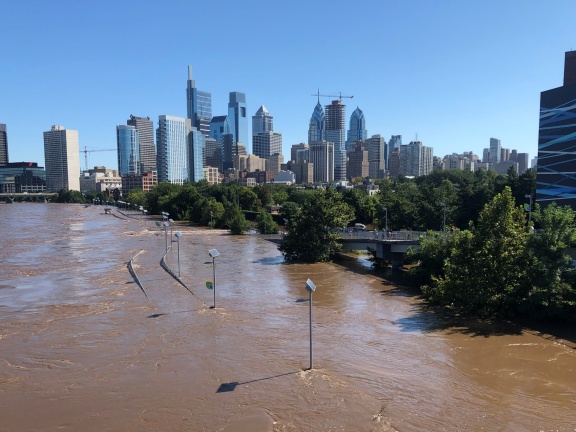
Background
The Greater Philadelphia region is currently confronting the consequences of climate change, and these consequences are expected to expand and intensify in the coming years. The consequences that pose the most severe direct risks are extreme heat, extreme precipitation events, and rising sea levels that will cause increases in the elevations of the tidal Schuylkill and Delaware Rivers.
The region is expected to see an increase of up to 12 percent in mean annual precipitation by 2050. The average number of days per year with temperatures exceeding 100 degrees could increase from a historical average of 0.3 to as many as 17 by the end of the century. And sea level in the region is expected to rise by up to 45 inches by the 2080s. These impacts will combine to produce a myriad of social, environmental, and public health impacts. Negative impacts include increased heat-related death and disease, increased costs for energy and insurance, and added stress to built and natural infrastructure. These impacts will fall most heavily on communities and neighborhoods that already struggle with the legacy of decades of disinvestment and discrimination.
Thoughtful planning and effective implementation can help communities to reduce their vulnerability and enhance their ability to adapt to the impacts of climate change. There is broad agreement – in the research literature and in lived experience – that resilience is most achievable when communities are actively and authentically engaged in timely planning and decision making. Such participation helps support transparency, knowledge sharing, and trust building, and increases the legitimacy of decisions and decision-making processes. It can also build community capacity and coherence that is, itself, a critical component of community resilience.
Opportunity Overview
The William Penn Foundation (WPF) would like to support efforts to advance community driven, place-based climate resilience plans. We are prioritizing support for initiating plans and for completion of plans that have already been started. We will not be funding plan implementation now.
Proposed projects must occur in the cities of Philadelphia or Camden. We are especially interested in plans that will primarily serve residents living in census tracts that are designated as overburdened and underserved by the Council on Environmental Quality’s Climate and Economic Justice Screening Tool .
We are requesting proposals for 1, 2, or 3-year projects. We expect that the appropriate project term will depend on the specific context in which you are working, including the groundwork that may or may not already be in place for the work. After reviewing proposals, WPF will conduct site visits and gather additional information from a limited number of organizations.
Organizations that propose projects in partnership with other applicants will be considered on their individual merits. However, the Foundation recognizes that the work necessary to make significant progress on this objective will be complex, and the most competitive proposals are consequently likely to be those that include robust partnerships that leverage complementary strengths, resources, and expertise.
Furthermore, the Foundation recognizes that there are many different tactics or approaches that could be used to advance the objective stated above. All proposals that meet the criteria described below are encouraged.
WPF has $1 million available to advance this objective at this time. There is no minimum or maximum that organizations may request. The grant amount requested should be commensurate with the contribution that the project will make to the overall objective.
Full Request for Proposals (RFP) and Application
Download the full RFP packet for more information about this opportunity including eligibility, review criteria, learning and evaluation, budget, and link to an application template.
All applications must be submitted through the Grants Portal.
Webinar
Interested organizations are invited to participate in an optional informational webinar on Monday, July 8, 2024 at 12:00PM ET. Following the live webinar, a recording will be posted to this page.